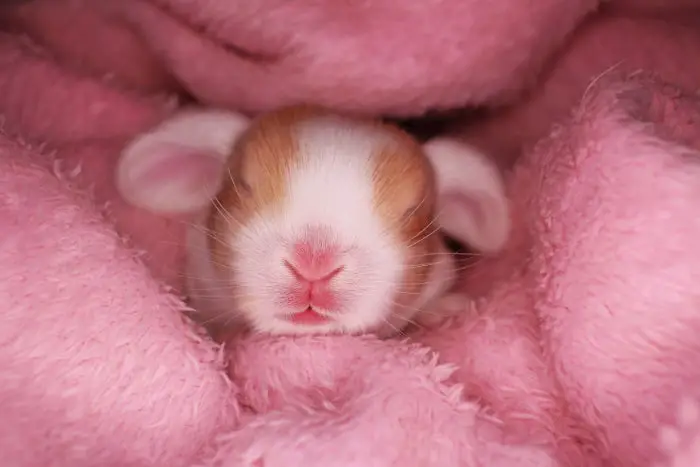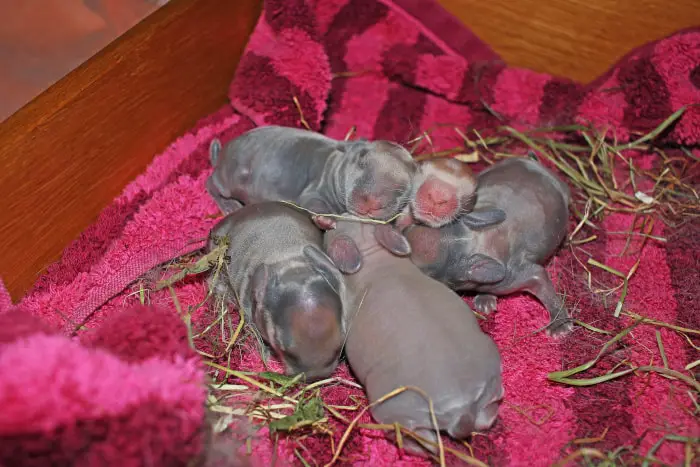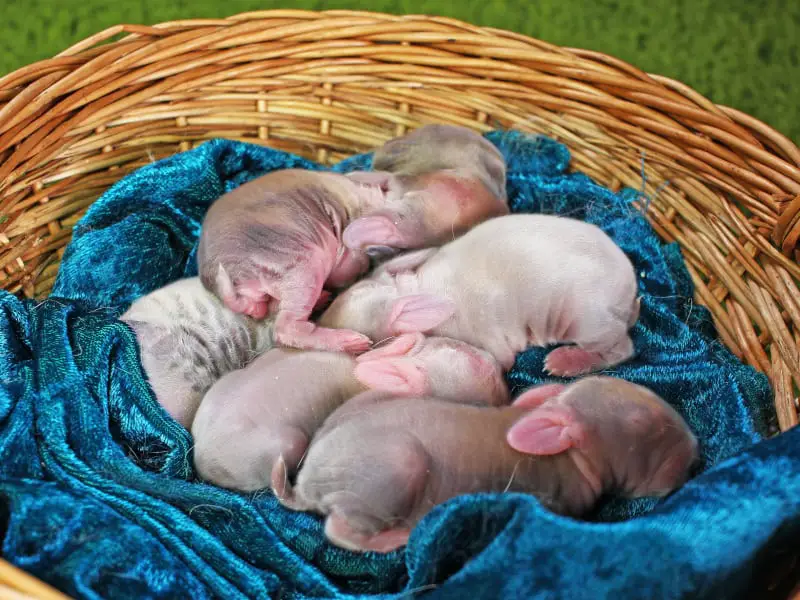Your sweet, beautiful doe is about to have its kits. You have waited for one month, and finally, they are here! The least you would expect is having to watch your loving rabbit eating the babies. For sure, this is a shocking image to conceive, but you better get ready!
So, the question for today’s article is: Will bunnies eat their babies? The answer is, well, sometimes!
We must emphasize that rabbits are not carnivores, so why do they eat their babies? Although the incidence of cannibalism among rabbits is low, there are several reasons why a rabbit can eat its young.
Survival Instincts
As we have seen, in the wild, rabbits are animals of prey, and as such, they need to do whatever is in their power to survive, even if this means that they have to kill their kits.
A doe that feels threatened and fears for its life could end the life of its babies with the sole purpose of destroying any evidence that attracts predators. This decision would allow it to escape and survive to have the chance to raise the next litter. Remember that rabbits are very fertile animals, and they could become pregnant as soon as they give birth to their young. So by the time this happens, this doe could already be pregnant with its next litter.
Natural Selection
Natural selection is another instinctive behavior among rabbits and many species of animals. Rabbits tend to separate the weaker born offspring, which are less likely to survive. They prefer to eat these babies to ensure the survival of the fittest. Similarly, they tend to eat those that have been stillborn to keep their nest tidy and clean.
What if our Pet Rabbit Eats its Babies?
We can understand that cannibalism can exist in wild rabbits, but when it comes to our beautiful and lovable pet rabbit, the scene is not at all pleasant. Well, even domestic rabbits can retain some of those wild instincts.
There are several reasons why your pet rabbit will behave like this. As a rule, a nervous and stress doe usually does not make a good mother. The best thing you can do is learn how you can prevent this behavior from occurring. Below we will explain the main reasons why your pet rabbit can eat its babies and what you can do about it:
First-time Mothers
Cannibalism is more common among first-time mothers. They tend to be frightened when giving birth as it is a new experience that can be quite traumatic, and they do not have their maternal instinct well developed. Due to inexperience, the doe may accidentally mutilate or kill their young while eating the placenta. A rabbit that is too young and has just reached its sexual maturity may not know how to handle labor and motherhood very well because it feels frightened by this new experience.
Stressful Environment
It is essential that the doe remains in a calm environment and that it is not disturbed when giving birth. If the area is too busy or noisy, the female may feel stressed, leading her to kill her young.
Another critical factor is that there should not be other animals around the nest, such as dogs and cats. Rabbits do not like to see other animals hanging around when they are about to give birth. They might consider them predators, and fear of predators may cause a mother rabbit to eat her litter. It is best to keep them in cages and isolated from these animals to avoid generating stress. You would prefer to keep all animals and visitors away from your rabbit’s nest.

Presence of Other Females
The doe may try to get rid of the baby rabbits if there is another female around. Rabbits are extremely territorial, especially if they have litters, and other females’ presence could become the cause of aggressive behavior. The mother can bite the kits if she feels there is not enough space in the cage.
Nutritional Deficiencies
Sometimes the doe could eat its entire litter. If this happens, you could think that the cause is due to nutritional deficiencies. Some rabbits may have litters of up to 14 rabbits or more. Therefore, it will need many nutrients to produce an adequate amount of milk during the nursing period. If for any reason, the rabbit feels it cannot supply enough milk for all the kits, it will end up getting rid of some of them.
Experienced breeders recommend not increasing the food supply until the 16th day of gestation to avoid obesity. It would be best to offer a slight increase in food because pregnancy and birth can be more challenging for obese females. Pregnant does tend to drink more water, so be diligent about keeping plenty available.
Lack of Water
An inadequate supply of water often causes the does to develop aggressive behavior. Water depletion is one of the most common reasons a female can eat her young. Also, if your bunny does not get enough water intake, lactation may not occur.
Mastitis
Another reason why the doe can eat its babies can be the appearance of illnesses like mastitis, a bacterial infection of the mammary glands. This disease will produce a lot of pain every time kits try to drink milk, which will cause aggressive behavior in the mother. The affected doe usually stops eating and may refuse to nurse her kits or eliminate the babies because it considers them the pain source. A doe can acquire mastitis while producing milk, so it is vital to keep its cage clean to avoid bacterial proliferation.
Nest
A rabbit can decide to sacrifice its young if it perceives that its cage and nesting box lack the appropriate conditions. A domestic rabbit lacks the materials that nature provides to build its nest, that is why you should give everything they need. It would be best if you offered a nest box with shavings in the bottom and some straw packed inside and materials to build the nest freely.
The female rabbit will take care of creating the perfect perch for its offspring. Place handfuls of nesting materials like straw or oatmeal hay inside the cage so that the doe can build its nest the way it likes.
After using the nesting materials, she will pluck some fur from the belly, sides, neck, and under the chin to make the nest cozy and warm.
Unfamiliar Scents
A rabbit can eat its offspring in case an unknown person touches its young. Rabbits become familiar with their owner’s smell, so only the owner should check the nest after delivery.
What Can Be Done to Keep your Rabbit from Eating the Offspring?
There are several things you can do to try to make your rabbit feel calm and comfortable:
Big Litters
If a doe has more than eight kits, you can transfer some of the kits to another mother with fewer kits if the young are about the same age. Doing this will make sure there is enough milk to go around. Most females will accept the young of another mother without any problem.
Getting Rid of Stress
It is essential to habituate your rabbit to be handled by humans and develop the confidence to help eliminate stress and threats. Handling and socialization from an early age are imperative to create a confident rabbit and avoid nervousness issues. Gentle handling of the kits from an early age will ensure well adapted and secure animals later in life.
Adequate Food Intake
All food offered to a pregnant rabbit should be of high quality and fresh. Food should have high caloric content. This way, the doe will be well-nourished and will be able to provide the requirements for adequate production of milk.
You can feed them with barley or crushed oats, roots, and hay in sufficient quantities. You can also increase the commercial pellet ratio between day 14 and day 21 of pregnancy.
A teaspoon of whole oats or sunflower seeds can help supply the pregnant rabbit’s need for extra fat. Sunflower seeds are high in fat and low in carbohydrates. They are immensely convenient once the rabbit begins to breastfeed due to their ability to increase milk production.
Water
Make sure your doe has a constant supply of fresh and clean water. You can add electrolytes or vitamin supplements to the water if the weather is too hot. Provide water bottles instead of bowls.
Nest Box
You must supply the necessary materials so that the doe can start building its nest. For this purpose, it will need a nesting box. Among the materials you can provide are:
- Wood shavings: Pine shavings soak up moisture and contain factors that inhibit molds and bacterial growth.
- Clean straw: Straw has high insulating properties, helping reduce kit losses to cold temperatures.
- Hay: The bunny can use timothy hay, orchard hay, or some other type of grass hay to pack inside the nest box.
The rabbit will finish preparing her nest by adding hair plucked from her belly or legs to make the nest more comfortable.

Keeping a Clean Cage
The cage of a pregnant and nursing rabbit should always remain clean to avoid bacteria’s proliferation that causes illnesses like mastitis.
Please get rid of all the damp materials and replace them with fresh materials. Replenish the area with clean, dry shavings if needed.
Try to touch the nest box as little as possible, but if the doe somehow fouls the entire nest, which occasionally happens, you will have to replace the whole nest bedding. You will need to be exceptionally gently while handling the babies.
Providing a Calm Environment
A pregnant and nursing rabbit needs a calm environment. Before giving birth, the doe will focus on building the nest, so the less commotion, the better. This condition is especially important for females that are preparing to give birth for the first time.
As mentioned earlier, an anxious or fearful doe may choose to eat its litter or refuse to feed them. A doe will not eat the babies if it feels safe in a nice cage. So, make sure their environment is safe, quiet, and free of predators.
Taking Care of Mastitis
If the rabbit develops mastitis, your vet may offer antibiotics treatment. A rabbit with mastitis cannot breastfeed its babies as it could transmit the infection to them. The kits born of a doe with mastitis should be hand-fed. Do not foster them to another doe, as this can spread the disease to the other doe, and the young.
To resume, it is better to keep these mothers happy and comfortable for the sake of the babies. Usually, rabbits improve their maternal instincts as they gain experience. Still, if this does not happen and eating their babies becomes repetitive, it will be better to have them spayed.

